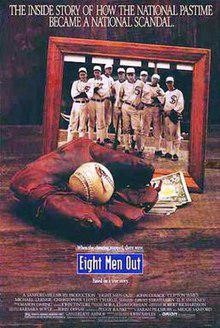
Eight Men Out is a movie telling how the celebrities of the 1919 Chicago White Sox team took gains from bettors to throw the World Series; if you haven’t already familiarised yourself with the story, chances are you will understand it after watching this film. The movie is based on Major League Baseball’s Black Sox Scandal, where eight team members conspired with gamblers to lose the famous 1919 World Series.
In 1919 the Chicago White Sox was viewed by the world as the best baseball team ever brought together. However, Charles Comiskey, the stingy team’s owner, gives a slight predisposition to reward the players for a splendid season. Today, blackjack NetBet offers a complete gaming solution for sports fans.
Bill Burns and fellow gambler Billy Maharg smell blood and are notified of the players’ dissatisfactions. They take this chance to ask Chick Gandil to convince his teammates that they could earn more by playing poorly and losing the 1919 series to Cincinnati Reds than actually going ahead and winning the series, including Eddie Cicotte, the star knuckleball pitcher. Eddie had been promised $10000 should he win 30 games for that season. However, Comiskey ordered the team manager to bench Eddie for two weeks to excuse that the star’s arm needed rest before the World Series. This motivated Eddie to join the conspiracy of the Eight.
Gandil, Swede Risberg, Lefty Williams, and several other players also join the scheme. In addition, Joe Jackson was invited though he is depicted as not so bright to fathom what is going on. Buck weaver, however, feels he was destined to win and thus pulls himself out of the scheme. As soon as the best of nine series commence, Cicotte, who is pitching in game one, intentionally hits Cincinnati Morrie Rath with his second pitch, signaling gangster Arnold Rothstein that the fix has been launched. He goes ahead to pitch poorly, giving up five runs in four innings. Gleason finally subs him, and the Sox lose the first game 9 to 1. Williams also pitched severely in the second game as Swede, Gandil, and Hap Flesch made conspicuous and unbelievable mistakes on the pitch. Despite this, the involved gamblers fail to pay what they promised, upsetting several players.
Journalists Ring Lardner and Hugh Fullerton smell a rat, but on the other side, the head coach is still convinced that his team will see it through the series. However, a third rookie pitcher Dickie makes both the gamblers and his teammates in distress as he wins game number 3 for the Sox. In the meantime, other players such as Weaver and Jackson are not ready to dive into the plot. Weaver goes ahead to deny being part of the fix. InRamessess number 4 and 5, Eddie Cicotte loses again, and the Six are now one game away from losing the World Series. With the title race in danger, the Sox win game 6 in extra innings. The team manager wants to bench Eddie for the next match but hurting in guilt, he pleads for a chance, and the coach awards him the opportunity though not wholeheartedly. The Sox managed to win game seven easily. Since the gamblers were still unpaid, Williams also wants to win, but his wife’s life is threatened and thus has to pitch poorly. On the other hand, Jackson hits a home run in the 3rd inning, but the Sox still lose the finals.
Cincinnati reds win the World Series by five games to 3. Fullerton, one of the Chicago journalists, wrote Raymonds an article to criticize the White Sox. Due to the nature of the competition, an investigation is launched to find out whether the World Series was a fix. Eddie Cicotte and Jackson admit that it was a fix in 1920. These findings led to the trial of Cicotte, Williams, Gandil, Flesch, Risberg, McMullin, Jackson, and Weaver. Even though the eight men are acquitted of any wrongdoing, they receive a lifetime ban from the new commissioner Kennesaw Mountain.
In 1925, Weaver watched Jackson play a semi-pro league game in New Jersey as “Brown” overhears other fans suspecting Brown to be indeed Jackson. He goes ahead to tell them that Jackson was the best player he had ever seen. When asked if Brown was Jackson, he denies it, saying, “those guys are gone now,” seriously pondering the famous 1919 World Series. It is later revealed by a title card that the eight were banned and never returned to Major League Baseball. Weaver, who had numerous futile tries to overturn his burn, died in 1956 still trying.
Remember to gamble responsibly.



